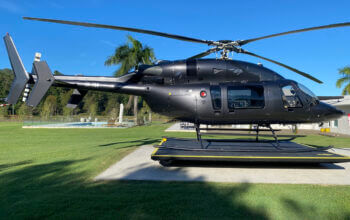Global aviation safety has come a long way in 10 years, with significantly less aviation accidents in the onshore resource sector since 2012.

The trend corresponds with the Flight Safety Foundation’s Basic Aviation Risk Standard (BARS) Program 10th anniversary.
BARS Program managing director David Anderson said the reduced aviation accidents in onshore resource sector directly correlate to the growth of the BARS Program.
“The Flight Safety Foundation developed the first Basic Aviation Risk Standard in collaboration with 12 Australian and American resource and mining companies to provide a more efficient means of monitoring, assessing and analyzing safety risks associated with contracted aircraft operators,” said Anderson. “As one of only three globally recognized standards, BARS’ Global Safety Data Analysis Program is a collaborative industry initiative that aggregates audit information to identify gaps in aviation risk management and improve safety standards across the industry.”
Since 2010, the BARS Program has grown to evaluate more than 200 aircraft operators and businesses contracting aircraft in a range of sectors including mining and resources, defence, agriculture, energy, government, insurance, humanitarian, corporate, and emergency services.
Mining company, Cerrejon, joined the BARS Program in 2012 after fellow BARS member organization (BMO), BHP Billiton, introduced the company to its auditing processes.
Cerrejen aviation manager Yesid Suarez described becoming a BARS member as a ‘win-win’ for both the BMO and aircraft operator.
“The BARS Program provides a ready-made framework to manage aviation risk providing us and our staff more confidence while travelling,” Suarez said. “As a BARS member, we are proud to be part of a program that is constantly identifying risks and trends to advance safety for all.”
Because contracting organizations with BARS membership share audit information, they also share the cost of auditing, with subscriptions to the globally recognized standard costing $53,000 instead of incurring independent contract aircraft audit costs, which could exceed +$2 million annually.
Exemplifying its leadership in the aviation industry, the BARS Program has evolved amid border lockdowns to assess the safety of aircraft operators remotely.
“Without the BARS Program, and now our remote monitoring audit solution, companies in a range of different sectors would need to wait months in the current climate for an auditor to be able to physically travel to conduct an assessment of an aircraft operator,” said Anderson. “BARS is continuing to offer businesses and governments that rely on contract aircraft peace of mind by ensuring safety standards are maintained at a time when many organizations are facing uncertainty and widespread restrictions.
“Now more than ever, BARS operates to ensure standards are met for contract aircraft enabling them to carry people home safely.”









